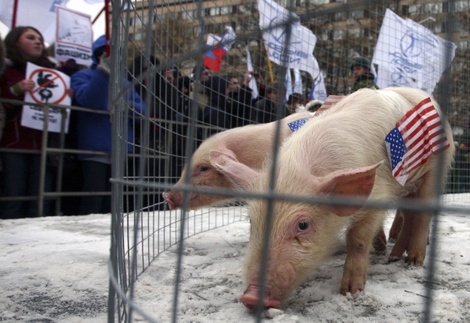If you add it all up, around 80 percent of the vote:
Discomfort with the election is evident in wide swaths of Russian society, even including Russian security forces. The overwhelming majority of Russians, one survey puts it at 69 percent, suspected even before the election that the results would be manipulated. In a survey by Moscow's Levada Institute, 94 percent of those polled said they had "absolutely no influence" on politics in their country.
David Hearst on Putin's new options:
He has enough of a majority in parliament to change the constitution. But he could equally well decide to anoint a successor as president, confident in the knowledge that he is popular enough in the country to be able to dominate from whatever other position he chooses for himself. His aides have recently floated the idea of Putin leaving the presidency but remaining "a national leader" - whatever that is. But if there is a choice between putting a weak placeman in power as president (such as his current prime minister Viktor Zubkov) and a strong one (such as his hawkish defence minister Sergei Ivanov) this result paradoxically favours the latter. It means that Putin is so well-established in the national consciousness, that he can afford to put a stronger man in as president, paying slightly less heed to the risk of splitting the leadership of Russia.
(Photo: Supporters of pro-Kremlin Young Russia movement stand near a cage with piglets symbolising, according to them, mercenary Russian politicians, serving US national interests as they celebrate the overwhelming victory by President Vladimir Putin's United Russia party in parliamentary elections in central Moscow, 03 December 2007. Russian President Vladimir Putin on Monday hailed his party's landslide election victory, even as Western governments voiced concern and urged the Kremlin to investigate allegations of fraud. By Dmitry Kostyukov/AFP/Getty.)
